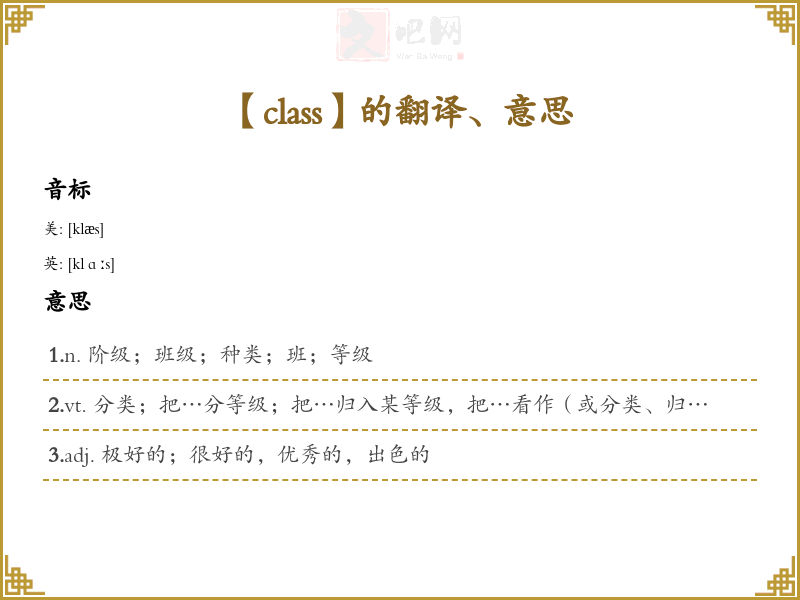【class】的翻译、意思
时间: 2025-03-04 21:58:34
【class】怎么读
美:[klæs]
英:[klɑːs]
【class】是什么意思、字义解释
1. n. 阶级;班级;种类;班;等级
2. vt. 分类;把…分等级;把…归入某等级,把…看作(或分类、归类);把…编入某一班级
3. adj. 极好的;很好的,优秀的,出色的
4. vi. 属于…类(或等级),被列为某类(或某级)
5. n. (英、德)克拉斯(人名)
【class】的详细解释
英文单词学*与分析:[class]
1. 基本定义
- 字面意思: "Class" 指的是一种分类或类别,通常用于将事物、人物或概念分为不同的组别。
- 词性: 名词(noun),动词(verb)。
2. 词源与起源
-
词源分析: “Class” 源自拉丁语 “classis”,意指“分类、等级”。词根“class-”与“cle-”有关,表示分组或分类。
-
历史背景: 该词首次被记录在英语中于14世纪,常用于社会学和教育领域,描述社会结构或教育系统中的等级。
-
课本:
- 在**的教材中,通常在初中和高中英语课程中出现。
- 在美国的教材中,"class" 通常在小学阶段(如《Oxford Reading Tree》)和中学阶段的社会学或英语课程中使用。
3. 使用场景
-
正式与非正式语境:
- 正式场合: 在学术论文或报告中,"class" 可以用来描述研究对象的分类。例如,“In this study, we categorize the subjects into three distinct classes based on their socioeconomic status.”(在本研究中,我们依据社会经济地位将受试者分为三类。)
- 非正式场合: 在日常对话中,"class" 可能用于描述朋友或同事的某种分类,例如,“I have a class with John on Thursdays.”(我周四有一节课和约翰一起上。)
-
特殊场合:
- 教育领域: "class" 常用于描述学生的学*班级或课程,例如,“She teaches a third-grade class.”(她教三年级的班级。)
- 社会学: 描述社会阶层时使用,如“the upper class”或“the working class”。
4. 示例句子
-
The mathematics class was very challenging.
- 这门数学课很有挑战性。
-
There are different classes of animals in biology.
- 生物学中有不同类的动物。
-
He belongs to the upper class of society.
- 他属于社会的上层阶级。
-
The class will be held every Monday morning.
- 这门课将在每周一早上上。
-
In chemistry, we learn about the different classes of compounds.
- 在化学课上,我们学*不同类别的化合物。
*. The teacher divided the students into small groups for the class project.
- 老师把学生分成小组来做班级项目。
-
She has a class for beginners in yoga.
- 她有一节针对初学者的瑜伽课。
-
The class of 2020 graduated last year.
- 2020届毕业生去年毕业。
-
Many students enjoy the art class for its creativity.
- 很多学生喜欢艺术课,因为它富有创意。
-
This class focuses on developing critical thinking skills.
- 这门课专注于发展批判性思维能力。
5. 同义词与反义词
-
同义词:
- Category: 指分类的总称,但通常不涉及社会阶层。
- Group: 指一群人或物,强调集合的概念。
-
反义词:
- Individual: 强调单独的个体,通常与“class”中提到的群体概念相对立。
- Chaos: 意指无序状态,与有序分类相反。
. 学方法
- 音标记忆法: /klæs/。可以通过将“class”与发音相近的词(如“glass”)联想以帮助记忆。
- 词根记忆法: 理解“class”的词源,可以联想到不同类别的事物,如“classify”(分类)和“classification”(分类法)。
7. 关联词汇
- Classmate(同班同学)
- Classroom(教室)
- Classify(分类)
- Class schedule(课程表)
- Class action(集体诉讼)
通过以上的分析,可以深入理解“class”这个词的多重含义和使用场景,帮助学*者在不同的语境中正确运用。
【class】例句
1、[N-COUNT] A class is a group of students who are taught together. 班
-
例:He had to spend about six months in a class with younger students.他不得不在一个比他小的学生的班上呆了大约六个月。
2、[N-COUNT] A class is a course of teaching in a particular subject. 课程
-
例:He acquired a law degree by taking classes at night.他通过上晚上的课获得了法律学位。
3、[N-COUNT] A class of things is a group of them with similar characteristics. 种类
-
例:Harbour staff noticed that measurements given for the same class of boats often varied.港口员工们注意到对同一类小船所给出的尺寸经常不同。
4、[N-UNCOUNT] If you do something in class, you do it during a lesson in school. 课
-
例:There is lots of reading in class.课上有大量阅读。
5、[[非正式]] If you say that someone or something has class, you mean that they are elegant and sophisticated. 品位
-
例:The most elegant woman I've ever met – she had class in every sense of the word.我曾见过的最高雅的女人–从各种意义上讲她都有品位。
6、[N-SING] The students in a school or college who finish their course in a particular year are often referred to as the class of that year. 同届学生
-
例:These two members of Yale's Class of '57 never miss a reunion.这两位耶鲁57届的同学从未错过一次重聚联欢会。
7、[N-VAR] Class refers to the division of people in a society into groups according to their social status. 阶级
-
例:...the relationship between social classes.…社会阶级间的关系。
-
例:What it will do is create a whole new ruling class.它要做的就是创造一个全新的统治阶级。
8、[V-T] If someone or something is classed as a particular thing, they are regarded as belonging to that group of things. 把…归类为
-
例:Since they can and do successfully inter-breed, they cannot be classed as different species.既然它们能够而且确实可以成功杂交繁殖,它们就不能被归为不同的物种。
-
例:I class myself as an ordinary working person.我把自己归类为一名普通的劳动者。
